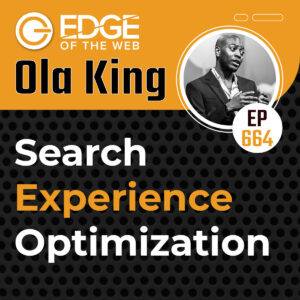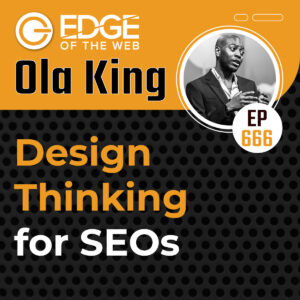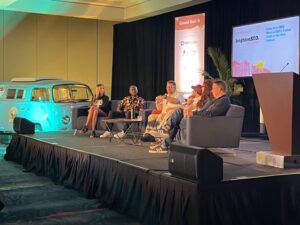 When we hosted our panel discussion at brightonSEO in San Diego last November, our experts had plenty of ideas about the future of SEO looked like, as well as the role of search generative experience (SGE) and artificial intelligence.
When we hosted our panel discussion at brightonSEO in San Diego last November, our experts had plenty of ideas about the future of SEO looked like, as well as the role of search generative experience (SGE) and artificial intelligence.
They had so many different good ideas that we jumped into some one-on-one conversations with our panelists to dig deeper into their ideas and expertise.
Recently, we spoke with Ola King, who comes to us from British Columbia by way of Nigeria. Ola is a self-described SEO nerd who has worked as a former UX researcher for Moz, hosted multiple MozCon events, and even hosted Moz’s Whiteboard Friday series. He is also a Notion ambassador and created great tools like SEO Growth Kit, Blackroot, Swift, and more.
We asked Ola a few questions about AI’s role in SEO and where he sees it going in the future. He had so much great information that we had to do two separate episodes to capture it all.
Erin Sparks and Ola first addressed the elephant in the room about the way AI has fundamentally changed the way users find information online.
Ola said there is still a product adoption curve among the general population, although SEO professionals are very aware of what AI products are available.
“There’s a major part of the population that doesn’t know how to use ChatGPT to find information, and SGE is not even available in Canada yet,” said Ola. “Luckily SEOs can get ahead of that.
The other thing Ola has noticed is that AI is helpful for searching for a lot of different types of content, at least for his own use. If he wants to search for something that’s very “spaghetti on the walls,” AI helps with that.
This is where AI can summarize dozens, if not hundreds, of sources of the same content — say, how to change a tire — and provide the information right on the SERP page rather than sending users to an actual website.
But if he needs a trusted source for his information or needs something to be verified, he will go to individual websites rather than rely on Google’s SGE answers.
So, will this bring about challenges to SEO? Will this change the way professional SEOs work and the way we create content?
Ola thinks it’s certainly going to raise the bar. To start with, it’s going to start taking away the low-hanging fruit and the easy pickings that SEOs often go after first. That also means that SEOs and content marketers will need to be more specific with their content.
As we said in our brightonSEO recap, content marketers will have to create content that is more detailed and nuanced. Rather than creating the ten thousandth article about how to change a tire, you’ll need an article about how to change a tire on a 2019 Kia Rio 5 in the rain or what the best snow tire in southern Indiana is.
Does the use of AI in SEO mean that SEO is dead? Erin asked.
Hardly. We’ve heard that question for the last 15 years whenever something changes or has a major impact on search engine optimization.
What makes the pundits’ cries of “the sky is falling!” so laughable is that whenever a major change comes along, you have to increase the value of your website. It doesn’t mean SEO is going away. As marketers, you have to create something more and more valuable for your site. That’s SEO. That’s optimization. It just means you have to get better at it, not that you can stop doing it.
If anything, says Ola, SEO is like the hydra in Greek mythology: You cut off one head, and two more pop up in its place.
That means you have to continue to focus on user behavior because that’s what is changing right now. Users don’t just want the basic generic answer that the Google SERP results are giving, they want a more comprehensive answer when they’re searching.
Google has been working to answer questions more succinctly, which has been training users to be able to be satisfied with the rich snippet answers that have received an AI-generated overview. This approach, called SGE, is still in its testing phase, but Ola thinks we’ll be seeing more of it in 2024.
It also means Google is trying to train its users on not needing to go to a website. Instead, they’re citing information and bringing the answer right to the user directly on the SERP page.
That’s going to hurt businesses’ web traffic even further because traffic leads to sales, subscriptions, and other CTAs. But how can we get that if users never have to visit our sites at all?
Instead, SEOs are going to have to do the best for the traffic you’re already getting and answer the best engagement needs for your consumers.
That’s going to happen when you fulfill the primary search intent of your customers. Trying to anticipate the other things that a person would need and understanding the real task that someone is trying to do with their search.
For example, if you have a travel site, you want to know whether people are trying to find out ideas for flights or if they are actually trying to book a flight. Are they doing research about their destination or are they ready to book a ticket right now? Understanding the intent and being able to provide helpful information will help keep your users on your website rather than relying on Google’s SERPs for the answers.
For many marketers, we’re not just in retention mode, we’re deepening into pursuit mode where you can provide continual information and be a regular resource for people.
That means, said Ola, there’s no place for keyword-focused content, it has to be intent-oriented. It has to be helpful. That means you have to understand more deeply about what your users are really pursuing. And you have to be able to reward your users with satisfactory and engaging experiences.
Ola also talked about how some industry predictions are that Google’s SGE could possibly cause a 25% drop in organic traffic for all websites, thanks to the zero-click search experience. Ultimately, that means we are going to have to change our roles as SEOs and digital marketers. We have to become search experience designers.
 That means that instead of optimizing for pages, you have to look at the entire journey a user will take, not only with your content but your entire product or service system.
That means that instead of optimizing for pages, you have to look at the entire journey a user will take, not only with your content but your entire product or service system.
That means making sure your entire system increases the user’s enjoyment factor, which means helping them find answers to questions they never even knew they had to ask.
That may mean serving up the user’s content in such a way that they can see the next steps in the journey on your website. They shouldn’t have to go back to the search engine to be able to refine their query. That’s like going to a restaurant and ordering an entree, but only getting a tiny appetizer.
That’s not enjoyable. It might taste good, but it’s not the enjoyment you would seek.
“You always have to understand the people you’re serving and the context,” said Ola. “So what does this person want to do? Is this something that they need information in 30 seconds? Or is this something they need a deep dive and you provide everything they will need to satisfy that?”
That also means, said Ola, focusing on people first, not statistics. You need to focus on what people want and what they want to experience when they get to your site. This means getting out of that singular landing page mentality. It means focusing on your entire website and the holistic user experience with your entire brand.
Ultimately, this comes down to how your brand communicates helpful information outside of your website. You need a comprehensive commitment from your brand from an omnichannel media standpoint. That means your social media posts, your Facebook ads, your press releases.
Erin and Ola talked for nearly 90 minutes over two episodes, including:
- SEO’s expanding role across the business. It now lives in between marketing, product engineering, and customer service. It needs to play a role in not only your web content but also your product connections and support documents.
- Align your content and products. The things you’re selling on your products digitally should have a connection to the content you’re creating. SEOs should align the digital products you offer and the content you create to serve your users better.
- Empathy and User-Centric Approach. Look at every aspect of the business as content and try to look at how you can serve the users better. Empathy is crucial because it helps you understand user needs across all aspects of the business.
- Design Thinking in User Experience. Embracing design thinking is essential, starting with understanding user needs, followed by defining scope, structure, skeleton (interface design), and visual design.
To learn more about Ola, including how he moved to Newfoundland at age 17 and how becoming a DJ and promoting his videos on YouTube led him to become an SEO expert, visit our website to listen to Episode 664 about Search Experience Optimization and Episode 666 about Design Thinking for SEOs.



